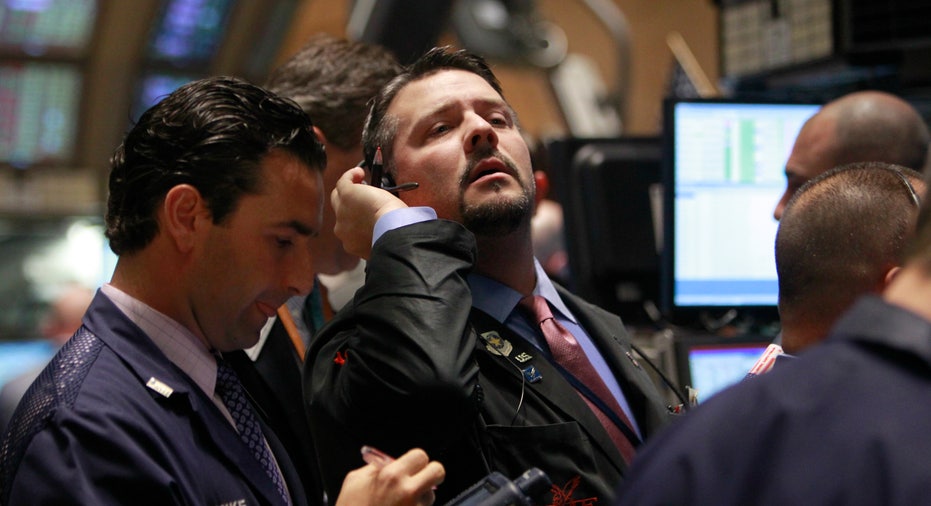Late-Summer Doldrums: Traders Ditch Equities, Dash to Defensive Assets

FOX Business: The Power to Prosper
The markets sustained steep losses and traders raced into shelters like gold on fresh data showing the labor market hit a wall last month, souring hopes Wall Street would make a quick turnaround following a brutal month.
Today's Markets
The Dow Jones Industrial Average tumbled 253 points, or 2.2%, to 11,240, the S&P 500 dipped 30.5 points, or 2.5%, to 1,174 and the Nasdaq Composite fell 65.7 points, or 2.6%, to 2,480.
The markets had been on a four-day winning streak prior to Thursday. In fact, despite the selloffs in the last two sessions, the Dow was only down 0.4% for the week, and the broader S&P 500 slipped 0.2%.
Every major sector was in the red, with financials such as JPMorgan (NYSE:JPM) energy stocks like BP (NYSE:BP) taking the worst beating. Meanwhile, utilities like Consolidated Edison (NYSE:ED) and consumer staples like Procter & Gamble (NYSE:PG) were spared the brunt of the selling.
While the selling was sharp, volatility was modestly high, with the VIX jumping by 5.6% -- a far cry from the 30% spikes that occurred during the early-August selloffs. However, traders made a clear run from equities into safe-haven assets. Gold soared $47.80, or 2.6%, to $1,877 a troy ounce. The precious metal is now less than 1% off of its record high.
The benchmark 10-year treasury yield dipped to 2% from 2.15% late Thursday -- just a hair above the all-time low set in mid-August. Yields on bonds move in the opposite direction of prices, so when traders begin buying bonds, the price goes up and the yield falls.
A slew of economic data released over the last several weeks have pointed to a slowing global economic recovery, and have potentially even foreshadowed a double-dip recession according to some economists. The labor market has been a major point of weakness, adding considerably fewer jobs every month than is the norm for a robust economic recovery.
The Labor Department reported employers added no jobs in August, missing expectations of an increase of 75,000 jobs. The level of job growth was the weakest since September 2010, when the economy actually shed jobs. The unemployment rate held steady at 9.1%. The forecast has been revised lower repeatedly as negative data have darkened the view over the last several weeks.
One important note is that the strike at Verizon (NYSE:VZ) cost 45,000 jobs that are likely to represent only a temporary reduction, since the strike has now ended.
Many of the underlying data points were negative, however. The government shed 17,000 jobs, while the private sector only tacked on 17,000. Average hourly earnings fell 0.1% against expectations of a 0.2% gain. Perhaps slightly encouragingly, the so-called labor force participation rate ticked up by 0.1%, meaning slightly more individuals are searching for jobs.
The report was certainly considerably worse than economists predicted, but analysts noted that it may not be quite as bad as it appears: "Unemployment rose only modestly, employment rose considerably and the labor force expanded," Daniel Greenhaus, chief global strategist at BTIG wrote in a research note. Still, Greenhaus notes, the present situation "to say the least, is not good."
The apparent economic weakness has many economists expecting the Federal Reserve will announce some level of additional economic stimulus after its meeting in September.
"We see today's report as increasing the probability of further monetary policy stimulus," economists at Barclays Capital wrote in a note to clients.
Federal Reserve Chairman Ben Bernanke made a speech late last week, saying the central bank is prepared to take additional actions as necessary, and the policy-making board will be meeting for an additional day in September to mull its options. Many Fed-watchers expect the Fed to begin investing in longer-term bonds, in addition to the usual short-term bonds, in a bid to force long-term rates down. Short-term interest rates, the Fed's usual monetary policy tool, are at essentially 0% -- the minimum possible level, meaning the Fed is pushing hard on the accelerator.
On the corporate front, The Federal Housing Finance Agency is set to sue more than a dozen big banks, such as Bank of America (NYSE:BAC) and Goldman Sachs (NYSE:GS), for allegedly misrepresenting the quality of certain mortgage-based assets during the period leading up to the financial crisis, according to a report by The New York Times. Mortgage-backed securities, and banks' role in creating and marketing them, have been a major point of controversy among regulators for their role in the financial crisis.
The euro zone debt crisis has been a lingering concern on Wall Street amid concerns financial problems on that side of the Atlantic may bleed over to the U.S. banking system.
Greece will miss its deficit cutting target in 2011 as the economic recession has deepened there. The Mediterranean country needs an enormous rescue package from European authorities to avoid a costly default on its sovereign debt, and its commitment to deficit reduction is a major determinant of the bailout package.
Energy markets followed equities into the red. The U.S. dollar rose 0.28% against a basket of world currencies, while the euro was down 0.45% against the greenback.
Light, sweet crude fell $2.48, or 2.8%, to $86.45 a barrel. Wholesale gasoline dipped 5 cents, or 1.8%, to $2.84 a gallon.
Foreign Markets
The English FTSE 100 fell 2.3% to 5,292, the French CAC 40 tumbled 3.6% to 3,149 and the German DAX slumped 3.4% to 5,538.
In Asia, the Japanese Nikkei 225 dipped 1.2% to 8,951 and the Chinese Hang Seng sunk 1.8% to 20,213.



















